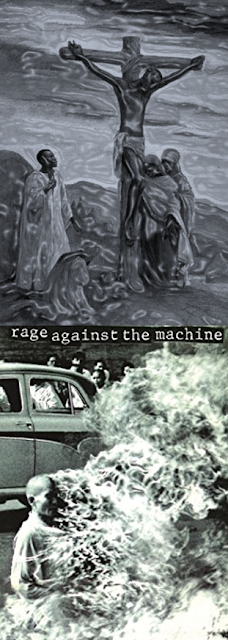Other Faiths & Christ, Part 2
A follow-up to the You Choose Sermon from last week (Other Faiths & Christ). This week's meditation is based on the questions, what do other faiths call God and what do they claim leads to God?
In God, Christ, and Holy Spirit we
have three avenues that lead to connection with God.
We’ve heard it said, God has many
names. And that’s absolutely true. The Christian notion of the Trinity alone
proves that!
Within these three avenues with
different names that lead to connection with God, we can place various world
religions. Let’s go through them, shall we?
First, there is the first person of the trinity, God as in God the Father, God of
Abraham. We might call this the strict monotheist avenue.
We would include in this avenue
Judaism and Islam.
Now, I’d like to say a word about
these two faith traditions. Of course, historically, adherents of these faiths
have been on the other sides of a long, continual battle. This historic
conflict is mostly related to geo-politics, specifically, a battle over Jerusalem
and the lands surrounding it. I don’t have time to go into all of that history.
But if we stay focused on the theology of these two faith traditions, they are
remarkably similar.
Islam and Judaism are both
strict-monotheists, strongly rejecting the Christian notion of the Trinity.
They share many of the same prophets
Abraham, Elisha, Moses, Dave, for example.
Judaism and Islam also share the
same stories – Adam and Eve; Noah and the floor; Abraham, Ishmael and Isaac;
Moses and Freedom from Enslavement, etc. are all shared stories found in both
the Quran and Torah.
As the last similarity suggests,
Judaism and Islam are both considered people of the book.
They both practice dietary
restrictions. Jews call it eating Kosher. Islam calls it eating Halal. In fact,
in small towns where there is only one kind of shop, either a Kosher shop or a
Halal shop, peoples of both faiths will shop there – a Muslim at a Kosher shop;
a Jew at a Halal shop - because of the similarities.
Islam and Judaism both place
importance on a pilgrimage, Muslims to Mecca, Jews to Jerusalem.
Even the word for God in the two
traditions are linked. In Judaism, the basic word for God in Hebrew is El. In
Arabic, Allah. Notice the similarity?
Abraham birthed three sibling faith
traditions. The oldest is Judaism. The middle child is Christianity. And the
youngest in Islam. Judaism and Islam, the oldest and youngest, as is known to
happen, have a sibling rivalry that has been going on for centuries. It is a
rivalry centered on land inheritance, also not uncommon.
Nonetheless, they are still
siblings. They share a history. They share DNA. They share One God. And
hopefully, these sibling traditions find some harmony, lasting and soon!
Okay, before we move onto the 2nd
avenue of the trinity, I’d like to add other faith traditions to the
strict-monotheist avenue. There are rather large Christian denominations that
are, like Judaism and Islam, not trinitarian. There is a branch of the
Pentecostal tradition that claims 30 million faithful members. It is known as
the Oneness Pentecostal church. They reject the traditional doctrine of the
Trinity and are stricter monotheists. The same for the Church of Latter Days
Saints which has 17 million members and the Jehovah Witnesses which has around
9 million members. Finally, Unitarian Christianity still has adherents
worldwide, especially in Hungary, Romania, and the U.S.
Now, we come to the Trinity’s 2nd name for and 2nd avenue
to full connection with God, Christ, the 2nd person of the Trinity.
I won’t spend much time on the 2nd
because, well, we are that 2nd avenue. In Christ, we have trinitarian Christian
churches, from the Church of the East, Eastern Orthodox, Roman Catholic, and
Protestant churches. Even if you take away the non-trinitarian Christian
churches I just mentioned, trinitarian Christianity is the largest religion in
the world.
Let’s move on to the 3rd name of and avenue to full connection with
God, the Holy Spirit. On the Holy Spirit
avenue we have religions outside the Abrahamic traditions. I’m talking about religions
like Hinduism, the 3rd most populous religion, Buddhism, the 4th,
and Taoism.
How does these religions relate to
the Holy Spirit? Well, among the godheads of the Trinity, the Holy Spirit is
the least personal.
What do I mean? Well, Christ being
personal is easiest to understand. Christ became a human person, as the gospels
tell us and remains personal, relating to us on a personal level. And God – El,
Allah, the Father – God is understood as a personal being in the Abrahamic
sibling traditions. This personal being God created the universe and relates to
us on a personal level.
While the Holy Spirit is
traditionally deemed as personal by orthodox Christianity, the Holy Spirit,
even in the traditional understanding, has non-personal aspects.
Spirit can be translated as breath
or even wind, implying that the spirit pervades reality in a different way than
a personal being would. The Spirit in this way can be seen as an impersonal
force or reality.
In fact, those non-trinitarian Christian
churches I mentioned above, Oneness Pentecostals and the Mormons see the Holy
Spirit as more impersonal, as a reality that emanates and moves in the world sort
of like wind does.
Well, this approach to the divine is
similar to religions like Hinduism, Buddhism, and Taoism and the way they see
ultimate truth, the ultimate reality. They see what we call God as an impersonal
reality, a force beyond the individual self that pervades, emanates, and
defines the universe.
Hinduism calls that ultimate reality
Brahman. Buddhism calls it Sunyata. Taoism calls it Tao. Remembering May the 4th
not too long, Star Wars call is it the Force! Christians call it Holy Spirit.
The last point, how do each of these
get the faithful to full connection with God? How does each avenue of the
Trinity lead us to God and to salvation found in God? Or simply, what is
salvation for each?
Well, the 1st avenue,
that of strict-monotheism exemplified by Islam and Judaism, Muslims and Jews
look to and take in what is laid out in their specific, divinely inspired holy
book. Follow the mandates of Torah or the Quran respectively, follow the way of
God laid out in those holy books, and you’ll know and be connected to God.
As for Christianity, the 2nd
avenue, the Word became flesh and dwelled among us, we follow not simply words
of a book. We follow the Word that is Christ. To follow like this means first
taking into ourselves the one being followed. So, we look to Christ. We love
Christ with our whole selves. And then naturally,
almost without trying, we follow Christ who we look to and love.
As for the faith traditions like
Hinduism, Buddhism, and Taoism, the 3rd avenue, the faithful seek to
experience the ultimate reality, contemplating its truths, meditating,
internalizing that ultimate reality, until they become at-one with that
ultimate reality and with all things as a result. This is called enlightenment.
I close by saying this: I’ve been talking
about avenues that lead to full connection to God. As a Christian, I believe
all avenues to connection with God in the end somehow first go through the
reality of Christ. Many paths lead to God, but those paths go through Christ in
the process.
I envision a funnel. World religions
live in that open-ended, large, circular space, the funnel mouth. Those
religious faiths will all eventually end in God. But they first are funneled
through the the funnel stem and spout, the conduit that is Christ. The conduit
of Christ then empties into full connection with God.
But here’s the thing. Christ is not
merely a person, but a way, a truth, a life
lived. That is what Jesus meant when he said, I am the way, the truth,
the life. The way of Christ, which is the way of love, the truth of love, the
life of love, we must all walk that way. Without the walking of this way, we
can only go so far in our journey toward and connection with God.
Christ as the lived-out way of
selfless love is the conduit that gets us there, that gets us home, that gets
us to the everlasting embrace of God.



Comments
Post a Comment